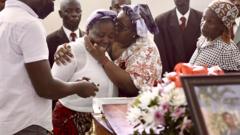Mozambique is grappling with a painful fallout from the recent presidential elections, where the loss of young lives during protests underscores a broader crisis. Mourners in Maputo's São Francisco Xavier Cemetery recently laid to rest 16-year-old Antonio Juaqim, who was tragically shot in the face while participating in a pot-banging protest against the election results. CCTV evidence reported by family members suggests that police opened fire on demonstrators, further deepening the sense of outrage in a country already marked by political tension.
Following the electoral commission's announcement declaring Frelimo's candidate, Daniel Chapo, the victor with 71% of the vote, opposition claims of rigged results emerged. Venâncio Mondlane, an independent candidate who previously distanced himself from the main opposition party, has galvanised his supporters to voice dissent, igniting nightly protests at 21:00 across Maputo. Initially celebrated as a movement for change by many, these protests quickly turned tragic, leading to the deaths of at least 40 people, including several children.
The emotional toll of Antonio's death was palpable during his funeral, marked by grief-stricken peers and moving tributes that celebrated his young life, now cut short by violence. His family highlighted the dangers faced by children involved in protests, with his uncle lamenting, "They are killing us and our future."
In a troubling twist, the police commander, Bernadino Raphael, expressed condolences while deflecting blame towards the protesters, accusing them of using children as shields during clashes. Meanwhile, activists and observers have condemned the excessive use of force by law enforcement in quelling dissent.
The ramifications of these events reflect the growing discontent towards Frelimo, especially among the younger demographic, who are critical of the government's ability to meet their needs. Analysts comment on the stark divide between the ruling party's image and the financial aspirations of Mozambique's youth, with deepening calls for economic independence overshadowing historical ties to the country's fight for liberation.
In light of Mondlane's supporters continuing their demonstrations, some injurious events further prompted collective mourning measures, revealing the entrenched divisions in the nation’s political landscape. As Mozambicans grapple with uncertainty in a turbulent moment for their democracy, the tragic loss of young lives serves as a haunting reminder of the need for justice and comprehensive change amid political unrest.























